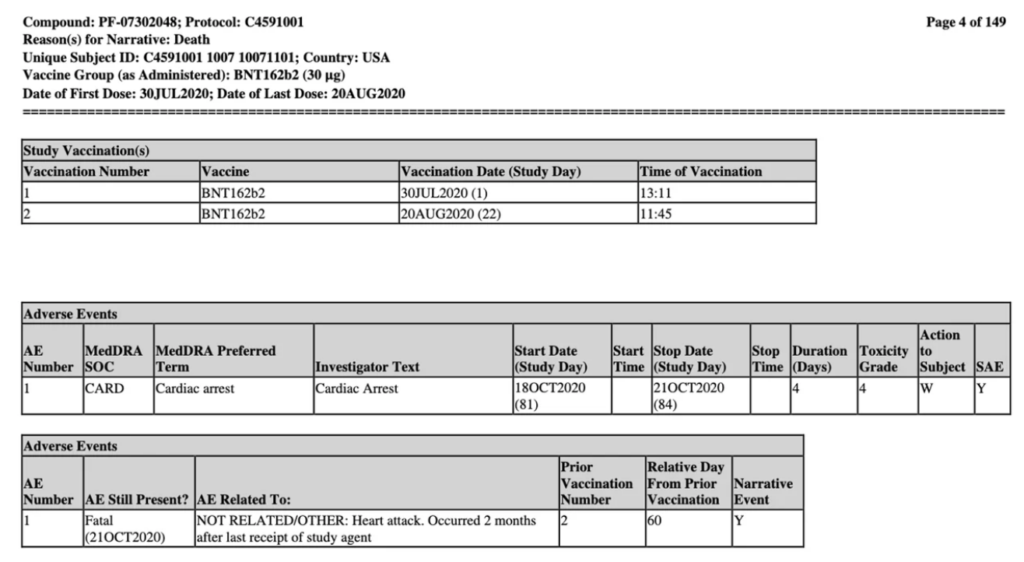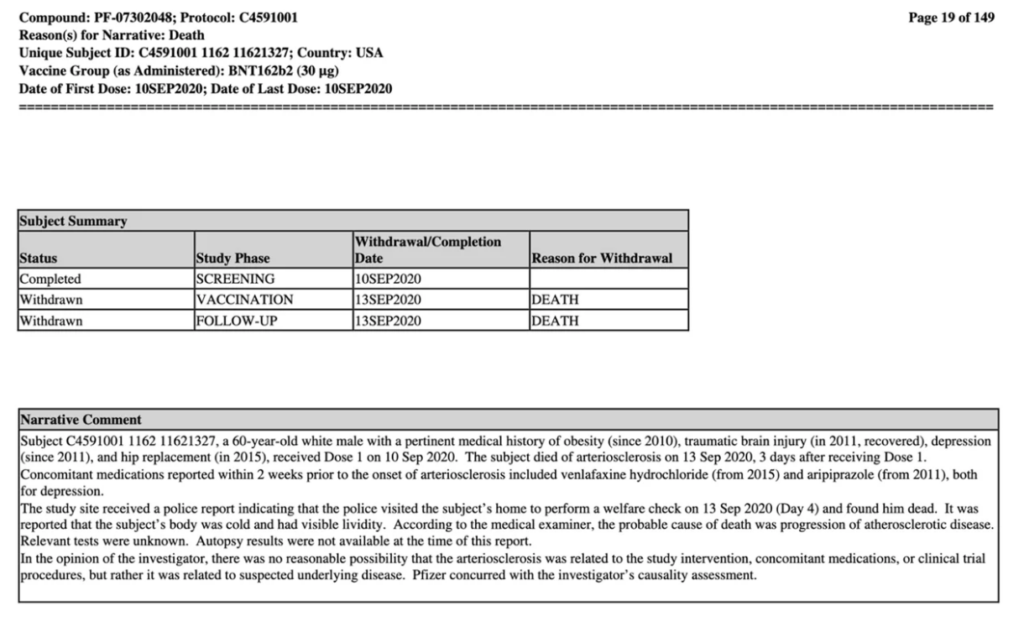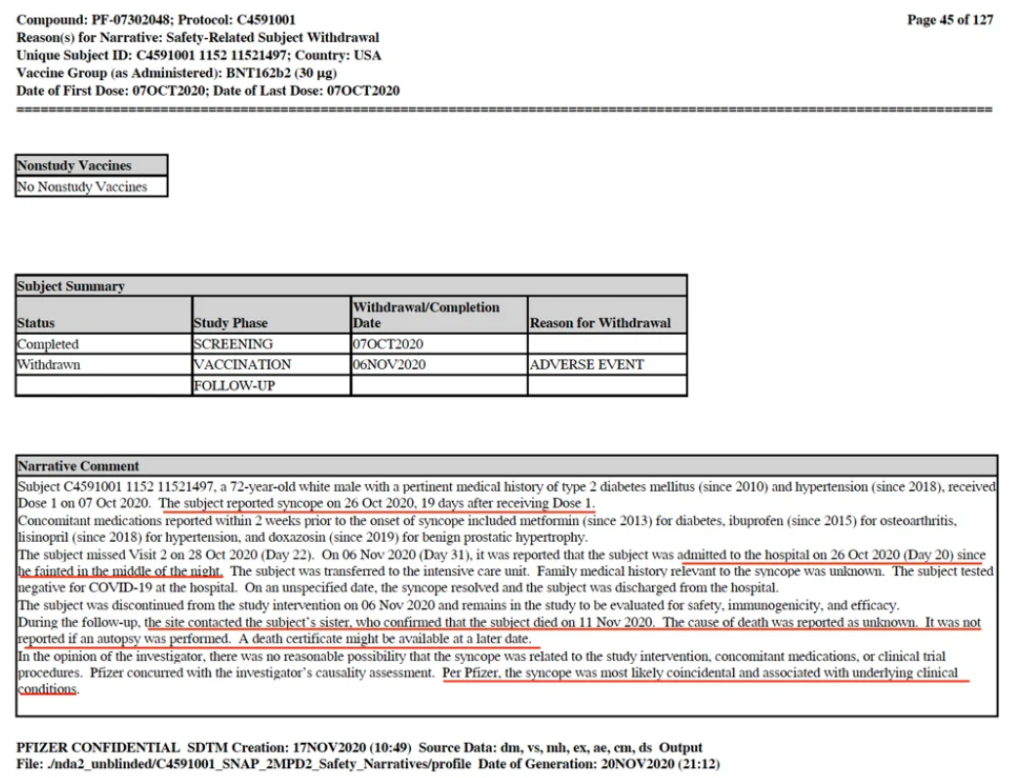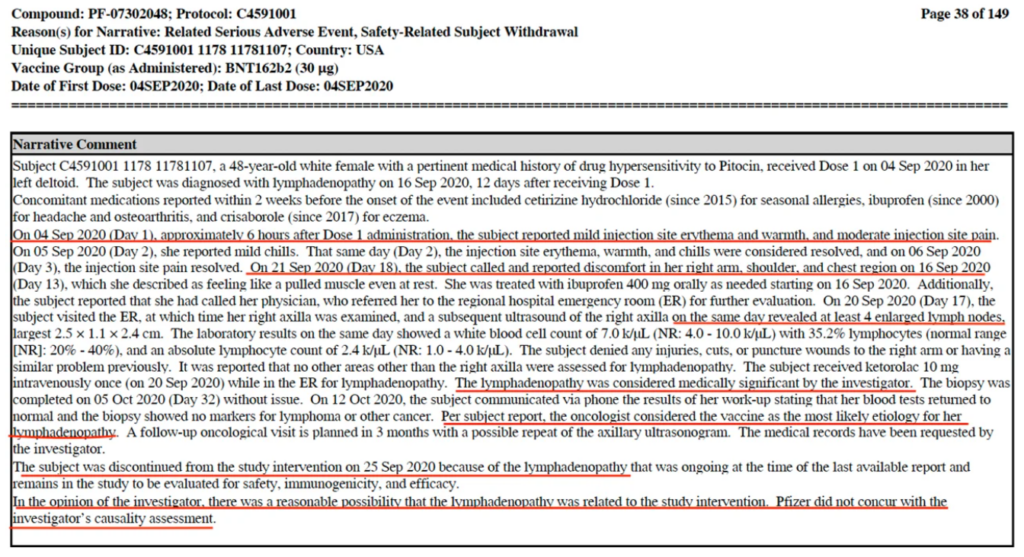Deaths After Vaccination in Pfizer Trial Not Fully Investigated, New Documents Reveal
Three participants in the Pfizer Covid vaccine trial died shortly after vaccination and their deaths were not fully investigated, it has been revealed.
The revelations come in a report from Pfizer released on July 1st by court order as part of the documents which the U.S. FDA relied on to grant emergency use authorisation for the Pfizer vaccine in December 2020. They add to worries that adverse effects of the vaccine in the clinical trials were not properly documented, giving a potentially misleading picture of the drug’s safety.
One of the deceased participants, a 56-year-old woman known as subject #10071101, was given two doses of the vaccine on July 30th and August 20th 2020 and died from a cardiac arrest two months later. In Pfizer’s report on the participant it says:
In the opinion of the investigator, there was no reasonable possibility that the cardiac arrest was related to the study intervention of clinical trial procedures, as the death occurred two months after receiving Dose 2. Pfizer concurred with the investigator’s causality assessment.
However, it’s not clear how the investigator and Pfizer can be so sure the death was unrelated to the vaccine when there was no autopsy and no thorough medical assessment. As Sonia Elijah, who has analysed the report and summarised parts of it for Trial Site News, comments:
The conclusion that “there was no reasonable possibility” the vaccine could have caused the fatal cardiac arrest because “death occurred two months after receiving Dose 2” is not only presumptuous but also lacks a robust medical assessment. This is evident by the further comment that “it was unknown if an autopsy was performed”. Why was there no follow up or inquiry into whether an autopsy was performed?

A second deceased participant was a 60 year-old man known as subject #11621327, who died three days after his first dose of vaccine, given on September 10th 2020. The report says that the “probable cause of death was progression of atherosclerotic disease”. However, the subject had no known history of the condition (though was reported as obese). While the investigator deemed there to be “no reasonable possibility” of a link with the vaccine, seeing that it happened three days after the injection and “autopsy results were not available at the time” of the report, again, it’s hard to see what that conclusion is based on.

A third deceased participant was a 72 year-old man known as subject #11521497, who received the first vaccine dose on October 7th and 19 days later, on October 26th, was admitted to hospital because “he fainted in the middle of the night”. Reported as a syncope (temporary loss of consciousness usually related to insufficient blood flow to the brain), 16 days later, on November 11th, he died. The investigator claimed there was “no reasonable possibility that the syncope was related to the study intervention” and Pfizer said the syncope was “most likely coincidental”. But again, it’s unclear what this assessment is based on as the cause of death was reported as “unknown” and neither the investigator nor Pfizer attempted to investigate.

There were also a number of serious but non-fatal adverse events among trial vaccine recipients, but oddly, in every case where the trial investigator deemed it to be possibly related to the vaccine, Pfizer “did not concur”, according to Sonia Elijah.

For example, a 71-year-old woman known as subject #11421247 developed severe ventricular arrhythmias in the evening following her second dose on October 14th 2020. The trial investigator wrote that “there was reasonable possibility that the ventricular arrhythmia was related to the study intervention [vaccine]”. However, Pfizer stated there was “not enough evidence to establish causal relationship”. This was despite arrhythmia being one of the adverse events of special interest (AESI) listed by Pfizer in its analysis of post-authorisation adverse event reports.
Another example is a 48 year-old woman known as subject #11781107, who developed lymphadenopathy with “at least four enlarged lymph nodes” in the period immediately after receiving her first (and only, as she withdrew owing to the adverse event) dose of the vaccine. The hospital oncologist stated the vaccine was the “most likely etiology [cause] for her lymphadenopathy” and the trial investigator said “there was a reasonable possibility that the lymphadenopathy was related to the study intervention”. However, once again, “Pfizer did not concur”.

This is another case where the adverse effect should have been anticipated, as toxicity studies in rats (contained in another of the Pfizer trial documents released under the court order) showed an “increased size of draining iliac lymph nodes”, meaning Pfizer was well aware of the possibility. Subsequently, a study published in Cell has shown that spike protein and mRNA from the Covid vaccines persist in human lymph nodes up to eight weeks post-vaccination.
These reports add to the accumulating evidence that adverse events in the trials were not fully or properly investigated and recorded, giving a potentially misleading picture of the vaccines’ safety. Such evidence includes the disturbing stories of Maddie de Garay, a 12 year-old girl who was left nearly blind and suffering daily seizures shortly after receiving the vaccine during the Pfizer trial, an injury which Pfizer recorded as unrelated “abdominal pain”, and Augusto Roux, who was hospitalised with heart inflammation which the hospital doctor wrote was an adverse reaction to the vaccine but which was recorded by Pfizer as unrelated “bilateral pneumonia”. In addition, Danish investigators have found that more people died in the vaccine arms of the mRNA trials than in the control arms. The need for proper investigation by the medical authorities into the safety of the Covid vaccines remains as urgent as ever.


Showing 1 comment
Sign in with